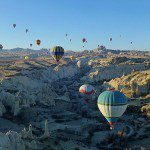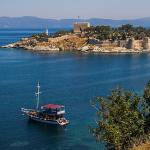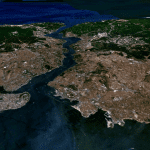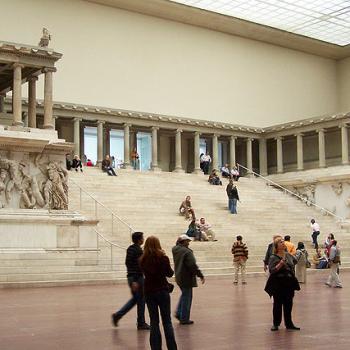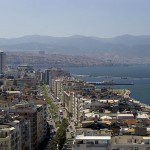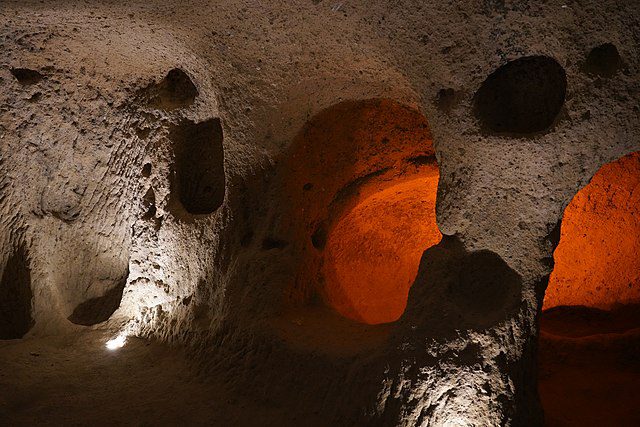
We held a sacrament service this morning at our hotel in Ürgüp. It was very enjoyable. Steve Densley conducted it, and Murat Çakır, who served as the branch president and in the mission presidency here for quite a while (and who currently teaches Sunday school), was our speaker. (More on that, perhaps, later.) Brother Çakır helped us to organize this trip, and he and his wife, Susan, have been traveling with us. At least four Muslim members of the hotel staff, three women and a man, sat right outside the door of the room where we met, listening and watching with surprisingly rapt attention. I wonder what they made of it. (Our congregational singing was pretty good, I think.)
A quartet that included two physicians who happen to be former members of the Tabernacle Choir, David Palmer and Brian Hales, sang “Brightly Beams the Father’s Mercy.” The other two members of the quartet were Steve Densley, the Interpreter Foundation’s executive vice president, and, well, the president of the Interpreter Foundation. Desperate times call for desperate action.
In thinking about “Brightly Beams the Father’s Mercy,” I couldn’t help but be reminded of parody lyrics that I heard on my mission in Switzerland. I don’t know who composed them. (Is anybody else familiar with what follows below?) They include many of the responses that we commonly heard while out tracting and knocking on doors:
Tue recht und scheue niemand.
Es ist wirklich alles gleich.
Jeder wird nach seiner Fassung
Selig werden im Himmelreich.
Alle Wege führ’n nach oben
Und ich habe keine Zeit.
Ich bin doch schon evangelisch
Und ich bleib’s in Ewigkeit.
For which I offer my hasty and unpoetic translation:
Do what’s right and fear nobody.
Every (religion) is really just the same.
Everybody will be saved in the Kingdom of Heaven
According to his convictions.
All paths lead to heaven,
And I have no time.
Anyway, I’m already an Evangelical
And I’ll remain so for eternity.
I’ve made two attempts at suicide during the trip thus far. Both occurred on the same day: First, I brushed my teeth with hydrocortisone instead of toothpaste. It tasted terrible, and then I actually looked at the squeezable tube that my wife had placed by the sink and recognized the, umm, inconvenient truth. Scrubbing and rinsing out my mouth became much more urgent than they had been just before. Then, at lunch that day, I sampled just a bit of a Turkish jalapeño pepper—the hottest I have ever tasted. It took easily ten minutes to stop feeling the pain.
The internet in our hotel for the past two nights was only good in the reception area, but terrible in our room. I mentioned it to one of our traveling companions. “What?” he said. “Are you living in some kind of a cave?” Well, as a matter of fact, I was. And it turns out—who knew?—that meter-thick limestone isn’t a good medium for wireless internet.
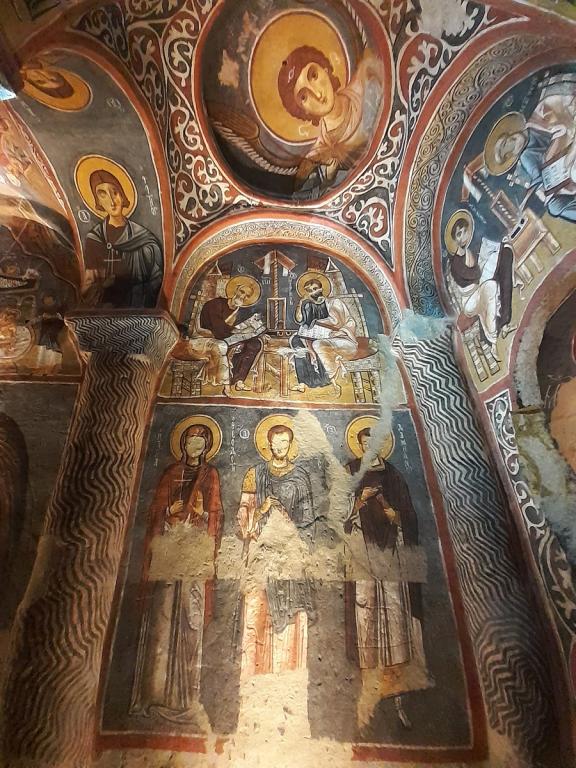
(Wikimedia Commons public domain image)
The Republic of Turkey occupies the Anatolian Peninsula and a bit of territory beyond it. But have I commented yet on the word Anatolia? It derives from the Greek word Ἀνατολή(anatole, pronounced approximately a-na-toe-LAY) which means “the East;” more generally, anatole denotes anything to the east of the person using the word, or simply, vague “eastern regions.” It refers to the direction where the sun rises; the Greek word ἀνατέλλω (anatello) means “I rise up.” In the Nativity story at Matthew 2:1-2, the “wise men” are said to have come to Jerusalem “from the east” (ἀπὸ ἀνατολῶν; apo anatolon), having seen the miraculous star “in the east” (ἐν τῇ ἀνατολῇ; en te anatole).
We went this morning to the underground city of Kaymaklı, a rabbit warren of rooms and storage areas that was cut from the rock on eight different levels. To this point, and to the best of my knowledge, thirty-six of these “underground cities” have been found in Cappadocia. (Depending on how you count them, the one in Derinkuyu has between eighteen and twenty floors, with a capacity for about 20,000 people.) One theory has it that the first two or three levels in each of them were excavated by the ancient Hittites, with the Christians of the sixth and seventh centuries AD creating the rest of the floors. There is no natural light in them, and it’s difficult to envision people willingly staying in them on a permanent basis. So, many think that they were places of emergency refuge, or even merely storage areas. But that last hypothesis can’t seem to explain the elaborateness of the “cities.”
They are a bit difficult to navigate, especially for someone who is relatively tall (as I am). With characteristic nobility, though, and thinking only of others who would eventually pass the same way, I sought to extend the height of some of the rock tunnels by means of my head. The resultant bleeding gained me a fair amount of sympathy, including that of three Muslim women at the end, who expressed their heartfelt concern and best wishes. Perhaps there should be a variation at the entrance of one of those Disneyland or Disney World signs: “You must be at least this short to enter the underground city.”
From Kaymaklı, we drove to the Uranos restaurant, a vast and curious complex that has been carved into a limestone hillside. Despite the busloads of customers who were there, the food was actually quite good.
Next, we entered Göreme National Park and, specifically, the Göreme Open Air Museum, a UNESCO World Heritage Site that is famous for its chapels carved into the rock, and for their tenth- or eleventh-century frescos depicting the life of Christ. Walking up into the hills, you see more than a dozen chapels and other buildings.
This evening, we drove by Uçhisar Castle in the Nevşehir Province of Cappadocia. It’s actually a 60-meter-high rock formation that is pockmarked by caves and crisscrossed by numerous underground passageways and rooms, now mostly blocked or impassable. In Byzantine times, the place was home to perhaps around 1,000 people. (Nobody lives in it now.) The view from it is said to be remarkable. Deep ravines and gulleys and rock outcroppings have been shaped by the wind and the weather into pyramids, cones, and towers of every size and shape. As has sometimes been said, the landscape is worthy of a painting by Hieronymus Bosch or Pieter Brueghel the Elder. One of the “fairy chimneys” that can be seen from atop Uçhisar actually houses a jandarma, a police station. We stopped just past it for photographs, just when the evening sun had painted it in bright light.
We will be flying early tomorrow morning to Izmir, the ancient Smyrna (reputed birthplace of the great Greek epic poet Homer), and we will be spending the night nearby, in Kuşadası. (Remember that the cedilla, the little squiggle, at the bottom of the Turkish letter c turns that letter’s normal j sound [as in jam or jello] into a ch sound [as in church], and, appended to the bottom of an s, makes that letter into a sh sound [as in sheesh and shout]. And that the dotless i—that is, the letter ı—is pronounced as a fairly dull uh sound. So Kaymaklı is pronounced roughly Kay-MAK-luh and Kuşadası is pronounced Koo-SHAD-uh-suh (and not KOO-sa-DAA -see, as I’ve often heard tourists say the word, leaving me to wonder sometimes how the Turks even know what they’re talking about).
True story: I was once walking along a sidewalk in a coastal town not far from San Diego. Somebody pulled up in a really expensive car and demanded to know if I could direct him and his passengers to LAH-jah-lah. I honestly had no idea, and I told him so. It was only after he had driven away that it dawned on me that he must have been referring to La Jolla(which is, of course, pronounced roughly la-HOY-uh). By then, it was too late to catch up with him.
Posted from Kayseri, Cappadocia, Türkiye


